 Petzlover
Petzlover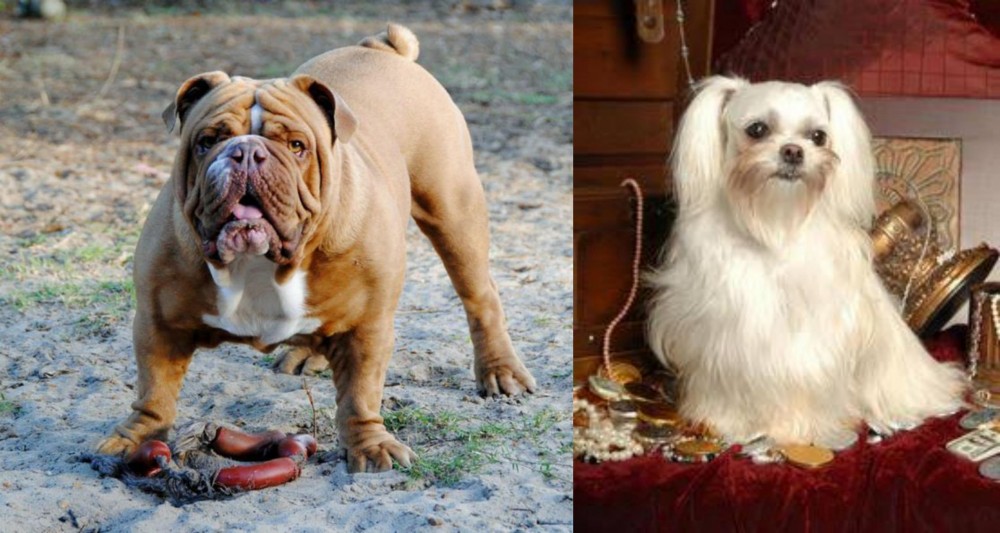 Australian Bulldog is originated from Australia but Toy Mi-Ki is originated from United States. Australian Bulldog may grow 20 cm / 8 inches higher than Toy Mi-Ki. Australian Bulldog may weigh 30 kg / 67 pounds more than Toy Mi-Ki. Both Australian Bulldog and Toy Mi-Ki has almost same life span. Australian Bulldog may have more litter size than Toy Mi-Ki. Both Australian Bulldog and Toy Mi-Ki requires Moderate Maintenance.
Australian Bulldog is originated from Australia but Toy Mi-Ki is originated from United States. Australian Bulldog may grow 20 cm / 8 inches higher than Toy Mi-Ki. Australian Bulldog may weigh 30 kg / 67 pounds more than Toy Mi-Ki. Both Australian Bulldog and Toy Mi-Ki has almost same life span. Australian Bulldog may have more litter size than Toy Mi-Ki. Both Australian Bulldog and Toy Mi-Ki requires Moderate Maintenance.
 The Australian Bulldog was bred from several breeds: The Bullmastiff, English bulldog, the English Staffordshire Bull Terrier and the Boxer. You will notice that his appearance is quite similar to the English bulldog, but this breed has a less-squished muzzle, fewer wrinkles and longer legs. They have great strength with a good thickness of the bone. They are solid and compact breed with good muscle tone.
The Australian Bulldog was bred from several breeds: The Bullmastiff, English bulldog, the English Staffordshire Bull Terrier and the Boxer. You will notice that his appearance is quite similar to the English bulldog, but this breed has a less-squished muzzle, fewer wrinkles and longer legs. They have great strength with a good thickness of the bone. They are solid and compact breed with good muscle tone.
The head structure of an Aussie Bulldog is one of its main attributes. It is very strong, square shaped with depth and width of muzzle less than a general bulldog. They have some wrinkle across the nose. Eyes are wide apart, large and clean. The jaw is wide and square, with strong teeth.
The name Australian Bulldog was given by Noel and Tina Green, the founders of the breed. They introduced Australian Bulldog to the public in 1998.
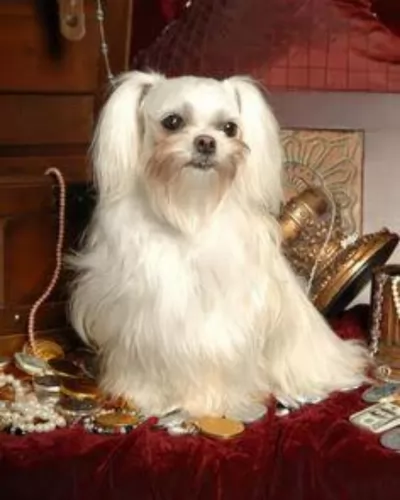 The Toy Mi-Ki is a sociable companion dog. He hasn’t got a long history, and the little bit of history there is, isn’t clear.
The Toy Mi-Ki is a sociable companion dog. He hasn’t got a long history, and the little bit of history there is, isn’t clear.
It is believed that the breed was bought about by Maureen Westburg. It was in the 1980s that she crossed several toy breeds to develop the Mi-Ki. It is thought that she gave the dog the name Mi-Ki because her name was Mikkie. It seems whe wanted a dog that came close to looking like a gremlin.
Some of the dogs used in the breeding program were the Japanese Chin, the Maltese, and the Papillon. The International Miki Registry is trying to get recognition with the United Kennel Club for this dog. There are other canine clubs and organizations that recognize the Mi-Ki Dog as a breed.
 Australian bulldogs can be very good companions considering their natural loyalty. They just love to interact with humans and they are rarely aggressive.
Australian bulldogs can be very good companions considering their natural loyalty. They just love to interact with humans and they are rarely aggressive.
They can be taught to be excellent watchdogs. The perfect place to raise this breed would be a house with a yard. The Australian Bulldog is usually dominant toward other dogs in its territory but, with proper training and early socialization, you can teach them to get along with other dogs and pets.
No matter if you are an active single, or you plan to bring an Australian bulldog puppy into the big family, as long as you are caring and loving toward him, he will be an amazing pet.
The Australian Bulldog is not recommended for apartment life. But, you can teach him to live in the smaller space if you tend to respect his daily need for activity. This breed is an indoor dog, and should not be left outside all day in a kennel. The best advice is to raise them in temperate climates since they can’t bear the extreme heat or extreme cold.
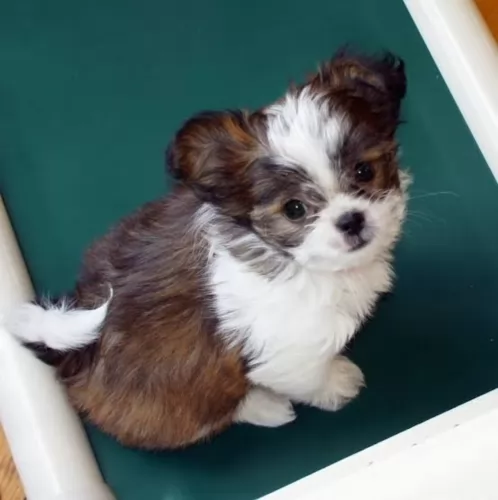 The small Toy Miki stands at between 25 cm – 30 cm in height and weighs between 2 – 5kg. You get two different coat types – long and short and the long-haired variety also has quite a bit of hair around the face.
The small Toy Miki stands at between 25 cm – 30 cm in height and weighs between 2 – 5kg. You get two different coat types – long and short and the long-haired variety also has quite a bit of hair around the face.
His longish coat is low-shedding which makes him popular for people who battle with allergies. The Miki Dog will produce about 2 – 4 puppies.
As a toy dog, he has a domed head with large eyes. Their ears are feathered and are carried erect and the tail is long and feathered.
These little dogs are popular companion dogs and they’re intelligent and loving, making the ideal pet for anyone.
It’s a friendly dog and yet he will bark to alert you of an intruder. Youll take notice because he isn’t the kind of dog that just yaps away.
Children love them and they make great playmates for children who have been taught to be kind and gentle with animals.
Their small size and their adaptable nature make them suitable for city or country living. Sweet and amicable, the social purebred Toy Mi-Ki is everything you want in a companion.
He is loyal and devoted, calm and adaptable. They’re not the kind of dogs to go jogging with you, but nonetheless, he will still need his exercise – walks every day as well as ball games.
 Australian Bulldog is a breed that will protect their family. They are great during the playtime with children as well. If you don’t have children, make sure you socialize your dog with children while he is still young.
Australian Bulldog is a breed that will protect their family. They are great during the playtime with children as well. If you don’t have children, make sure you socialize your dog with children while he is still young.
They are extremely intelligent. You can teach you Australian Bulldog almost everything in a very short time.
early socialization is a must with the Australian Bulldog.
you should start to train your Australian Bulldog as soon as possible. Positive reinforcement-based training methods are the ones you need to master in order to raise a good Australian Bulldog. They will be trained easily if there is a firm, consistent hand in training and they need leadership role from their owners. They can be taught very easy to be obedient and they love playing games like Frisbee, catch, water activities (but they swim very rarely because of their big and heavy chests), exploring the nature.
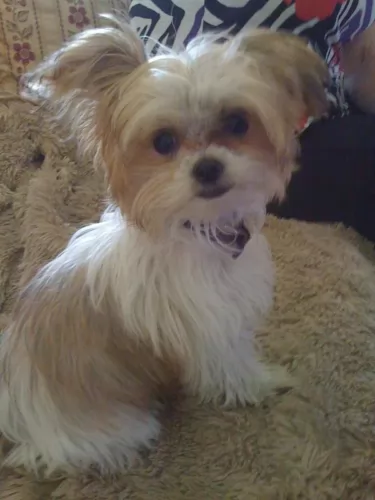 The Mi-Ki is calm and good-natured, and because of his cuteness, he can’t help but become a lap dog, if you allow him.
The Mi-Ki is calm and good-natured, and because of his cuteness, he can’t help but become a lap dog, if you allow him.
He is social and just loves human companionship. He is friendly too and will quite happily be friends with children and pets in the home.
Make sure he is trained and socialized so that you become one of the many people who have nothing but good things to say about this sweet little dog.
 Australian Bulldog has better health than the English bulldog and its health continues to improve with each generation.
Australian Bulldog has better health than the English bulldog and its health continues to improve with each generation.
The pushed-in face causes harder breathing. Be aware that they can’t use the air to cool itself off as quickly as necessary. During the extreme heat, Australian Bulldogs can develop heat stroke and die from it.
Take special care of the wrinkles on their nose. They will require everyday care since wrinkles need to be cleaned and kept dry to prevent the skin infection. Bath the dog only when it is necessary because of too much bathing with soap damages the natural oils in its skin.
The Australian Bulldog, on average, is fed two times a day. They have the high risk of obesity, so there is no real need for more than two meals. Make sure to choose a premium quality food and to feed the dog according to the instructions. Also, they need lots of fresh water since they will be super active pet.
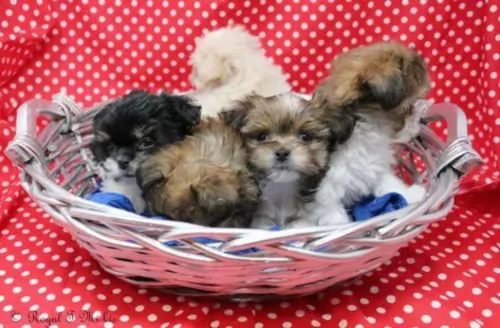 You just have to bear in mind, that because of his short muzzle, he is prone to respiratory problems. Too much exercise and you may find him huffing and puffing. Be careful on a hot day.
You just have to bear in mind, that because of his short muzzle, he is prone to respiratory problems. Too much exercise and you may find him huffing and puffing. Be careful on a hot day.
Also, little dogs like this often have all kinds of dental problems. When you brush him, check his teeth because he can’t tell you if he has a rotten tooth causing him a lot of pain and misery.
Check his eyes too that they are bright and clear and check the inside of his ears. Hypothyroidism and eye issues can also bother the Mi-ki.
 Feeding the puppy and adult: high-quality dog food for active dogs is a must. Do not overfeed them. If you are not sure about the amount of food your dog really needs, please consult a vet.
Feeding the puppy and adult: high-quality dog food for active dogs is a must. Do not overfeed them. If you are not sure about the amount of food your dog really needs, please consult a vet.
The Australian Bulldog needs minimal grooming. They should be brushed at least once a week using a firm bristled brush. They shed a moderate amount on a regular basis so there will be loose hair to deal with. Make sure to clip the nails when necessary. They will need a tooth brushing two times a week and checking and wiping its ears once a week.
Points for Good Health: every day long walks, plenty of exercises, special skin care and regular vet check-ups.
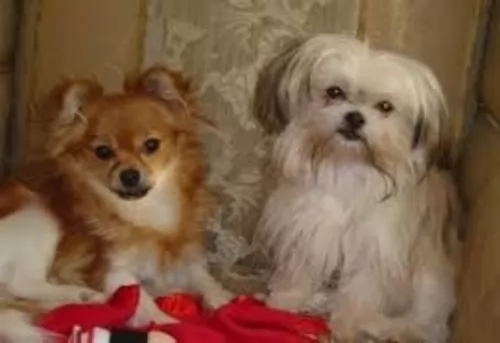 Considered to be low-shedding, the Mi-Ki will benefit from a brush once or twice a week.
Considered to be low-shedding, the Mi-Ki will benefit from a brush once or twice a week.
Some people take their Mi-Ki’s to have their hair professionally cut. This is a good move because then the ears, teeth, and nails are attended to as well.
You can do all of these things at home yourself, but sometimes, particularly with the long-haired Miki, the matting of the hair can make it that you rather send him to professional groomers.
Like all dogs, the Mi-Ki dog will need nutritious food if he is to stay healthy. He isn’t a big eater and you will find the perfect food for your small canine pet.
Read on the packaging to make sure you get high-quality dry food for small dogs. You want the ingredients to be as natural as possible without any toxic colorants and additives.
Meat and protein must always be the top ingredients. Try to provide some home-made food too. Boiled chicken, brown rice, spinach, and sweet potatoes can be chopped up finely and a small portion added occasionally to the dry kibble as a tasty treat.